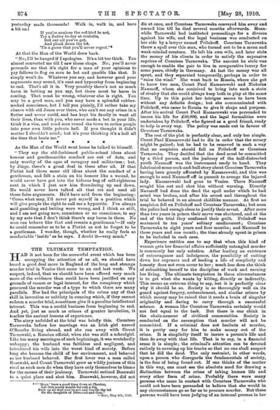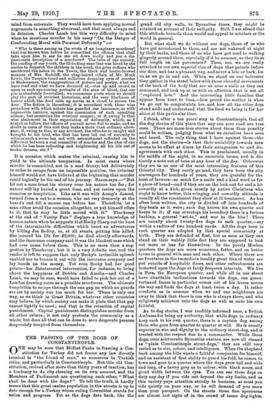THE ULTIMATE TEMPTATION.
HAD it not been for the sorrowful event which has been occupying the attention of us all, we should have heard a good deal more in England of the long and strange murder trial in Venice that came to an end last week. We suspect, indeed, that we should bare been offered very much more of the evidence than could have been justified on any grounds of reason or legal interest, for the conspiracy which procured the murder was of a type to which there are many parallels. Nor had the principals of the crime any of that skill in invention or subtlety in cunning which, if they cannot redeem a murder trial, sometimes give it a peculiar intellectual interest. This was a sordid business from beginning to end. And yet, just as much as crimes of greater involution, it leaches the ancient lessons of experience.
The story unfolded at the trial was briefly this. Countess Tarnowska before her marriage was an Irish girl named O'Rourke living abroad, and she ran away with Count Tarnowski, a Russian official, when she was still a schoolgirl. Like too many marriages of such beginnings, it was wretchedly unhappy ; the husband was faithless and negligent, and introduced his wife into the worst kind of society. Before long she became the child of her environment, and behaved as her husband behaved. Her first lover was a man called Bosewski, and Count Tarnowski grew as wildly jealous of this rival as such men do when they have only themselves to blame for the causes of their jealousy. Tarnowski enticed Bosewski to a quiet place and shot him. Bosewski, however, did not
• " ' "Maya' have a good time down at Chester, Let this merry month furnish a tip, Pack up all that you've got and bundle the lot On the daughter of Desmond and Gyp."
—Star, May 4th, 1210.
die at once, and Countess Tarnowska conveyed him away and nursed him till he died several months afterwards. Mean- while Tarnowski had instituted proceedings for a divorce against his wife, and the legal business was conducted on her side by a lawyer named Prilukoff. Countess Tarnowska threw a spell over this man, who turned out to be a mean and weak-minded creature. He left his own wife, and later stole the money of his clients in order to satisfy the expensive caprices of Countess Tarnowska. The amount he stole was enough to enable the pair to live in comparative luxury for some years, chiefly in Germany. At last the money was all spent, and they separated temporarily, perhaps in order to "raise the wind." She went back to Russia, where she got to know two men, Count Paul Kamarowski and Nicholas Naumoff, whom she contrived to bring into such a state of rivalry that she could always keep both in play at the same time. Up to this point her intrigue seems to have been without any definite design; but she communicated with Prilukoff, who came to Russia to give it shape and purpose. After his arrival Count Paul Kamarowski was persuaded to insure his life for £20,000, and the legal formalities were undertaken by Prilukoff, who figured as a. good friend, ready to help in every way. The policy was made out in favour of Countess Tarnowska.
The rest of the plot is perfectly clear, and only too simple. Count Paul Kamarowski had to die in order that the money might be gained; but he had to be removed in such a way that no suspicion should fall on Prilukoff or Countess Tarnowska. They decided that the deed must be committed by a third person, and the jealousy of the half-distracted youth Naumoff was the instrument ready to hand. They fabricated some cock-and-bull story about Countess Tarnowska having been grossly affronted by Kamarowski, and this was enough to send Naumoff off in pursuit to avenge the injured lady. Kamarowski had gone to Venice. There Naumoff sought him out and shot him without warning. Directly Naumoff had done the deed the spell under which he had acted was broken, and after his arrest and throughout the trial he behaved in an almost childlike manner. At first no suspicion fell on Prilukoff and Countess Tarnowska; but soon the police had enough clues to justify their arrest. After more than two years in prison their nerve was shattered, and at the end of the trial they confessed their guilt. Prilukoff was sentenced to ten years' solitary confinement ; Countess Tarnowska to eight years and four months ; and Naumoff to three years and one month ; the time already spent in prison to be included in each case.
Experience entitles one to say that when this kind of woman gets her financial affairs sufficiently entangled murder is commonly her only solution. After leading an existence of extravagance and indulgence, the possibility of cutting down her expenses and of leading a life of simplicity and honesty does not even occur to her ; much less does she think of submitting herself to the discipline of work and earning her living. The ultimate temptation in these circumstances is to get what she wants by killing, directly or indirectly. This seems an extreme thing to say, but it is perfectly clear why it should be so. Society is so thoroughly well on its guard against forgery, embezzlement, and similar crimes by which money may be raised that it needs a brain of singular originality and daring to carry through a successful scheme. A woman like Countess Tarnowska certainly would not feel equal to the task. But there is one chink in the chain-armour of civilised communities. Society is conducted on the assumption that murder will not be committed. If a criminal does not hesitate at murder, it is pretty easy for him to make money out of the crime. It is simplicity itself to insure a person's life and then do away with that life. That is to say, in a financial sense it is simple ; the criminal's attention can be devoted entirely to covering up his tracks so that no one shall suspect that he did the deed. The only restraint, in other words, upon a person who disregards the fundamentals of society, is the fear of being found out. If one thinks of the matter in this way, one must see the absolute need for drawing a distinction between the crime of taking human life and every other form of crime. Probably there were many persons who came in contact with Countess Tarnowska who could not have been persuaded to believe that she would in any circumstances go so far as to procure murder. But these persons would have been judging of an internal process in her
mind from externals. They would have been applying normal arguments to something abnormal, and that must always end in delusion. Charles Lamb has this very difficulty in mind when he mentions murder in his essay " On the Danger of
Confounding Moral with Personal Deformity ":- " Who is there among ns [he wrote of an imaginary murderer] that has known him before he committed the offence that shall take upon him to say he can sit down coolly and pen a dis- passionate description of a murderer! The tales of our nursery, the reading of our youth, the ill-looking man that was hired by the uncles to despatch the children in the wood, the grim ruffians who smothered the babes in the Tower, the black and beetle-browed assassin of Mrs. Radcliff, the shag-haired villain of Mr. Monk Lewis, the Tarquin tread and millstone dropping eyes of murder in Shakespeare, the exaggerations of picture and poetry, what we have read and what we have dreamed of,—rise up and crowd in upon us such eye-scaring portraits of the man of blood, that our pen is absolutely forestalled; we commence poets when we should play the part of strictest historians, and the very blackness of horror which the deed calls up serves as a cloud to screen the doer. The fiction is blameless ; it is accordant with those wise prejudices with which nature has guarded our innocence, as with impassable barriers, against the commission of such appalling crimes ; but meantime the criminal escapes ; or if, owing to that wise abatement in their expectation of deformity, which, as I hinted at before, the officers of pursuit never fail to make, and no doubt in cases of this sort they make a more than ordinary allow- ance, if, owing to this, or any accident, the offender is caught and brought to his trial, who that has been led out of curiosity to witness such a scene has not with astonishment reflected on the difference between a real committer of murder and the idea of one which he has been collecting and heightening all his life out of books, dreams, etc. ? "
It is occasion which makes the criminal, causing him to
yield to the ultimate temptation. In most cases where murder is committed, not in a mad frenzy, but deliberately in order to escape from an impossible position, the criminal himself would not have believed at the beginning that murder could logically be the end of his journey. Bacon says :—" But let not a man trust his victory over his nature too far; for
nature will lay buried a great time, and yet revive upon the occasion or temptation. Like as it was with Aesop's damsel, turned from a cat to a woman, who eat very demurely at the board's end till a mouse ran before her. Therefore, let a
man either avoid the occasion altogether, or put himself often to it, that he may be little moved with it." Thackeray at the end of " Vanity Fair" displays a true knowledge of human nature when he suggests that Becky Sharp cut the knot of the interminable difficulties which beset an adventuress by killing Jos Sedley, or, at all events, getting him killed.
She insured his life for £2,000; he died shortly afterwards, and the insurance company said it was the blackest case which had ever come before them. This is no more than a sug- gestion by Thackeray; but it is a very definite one, and the reader is left to suppose that only Becky's invincible aplomb enabled her to brazen it out with the insurance company and lay hands on the money. Yet even Becky had her good points—her disinterested intervention, for instance, to bring about the happiness of Dobbin and Amelia—and Charles Lamb, we may be sure, would have failed to pick her out of a London drawing-room as a possible murderess. The ultimate temptation to escape through the one gap on which no guards
are set by society was too much for her. There is only one way, as we think in Great Britain, whatever other countries may believe, by which society can make it plain that that gap cannot lightly be used; and that is the retention of capital punishment. Capital punishment distinguishes murder from all other crimes ; it not only protects the community as a whole, but does all that can be done to save desperate persons desperately tempted from themselves.















































 Previous page
Previous page